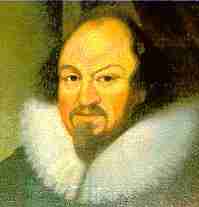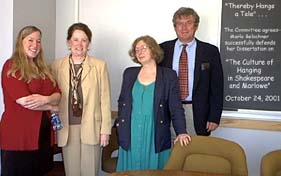
Marlowe Lives!
Dedicated to the proposition that Christopher Marlowe was not killed in 1593, but lived long enough to write poems and plays attributed to the actor William Shakespeare.
Wednesday, April 30, 2003
Bad spots in The Marliad
Look, I'm a poet, not a webmaster, so I used Microsoft Word to post The Marliad to the web, with a result more unseemly than the verses themselves may be to some: when I looked at it Internet Explorer this morning, this puzzling message appeared under the title.
(Un)fortunately, I'm off to Florida this morning to attend my daughter Rachel's MSW graduation ceremony, so the fix will have to wait til I get home next week. In the meantime, some of you may want to download Netscape 7.0, which is better than IE anyway. While others of you may find more "bad spots" in the poem itself, than in the undigested bits of Java(?) script sprinkled throughout.
Website comes alive
After many months of hibernation, the official website of the Marlowe Lives! Association is back online. Just for fun (and because it's my birthday), I'll tip off the gang at HLAS and see what they have to say. Only one or two of them have seen excerpts from The Marliad, so I'm hoping for some helpful commentary, but expect to be skewered.
Sunday, April 27, 2003
Miranda her litel Booke contains big discovery
 Did a nameless, homeless Christopher Marlowe take on the identity and reputation of the man pictured above, Richard Boyle - and rise in power and wealth to become "first and great Irish earl of Cork"? I've contacted author Darby Mitchell about this and other possibilities presented in her new novel, an ingenious tale that uses all non-fiction materials --biographical records of Richard Boyle, John Boyle, Walter Raleigh, Edmund Spenser, and William Shakespeare, chronologically, showing what each is doing at what time, so that the reader gets a comparative chronological view of the persons and the time. The narrator, Miranda, and her style, and the letters between R. Boyle and Shakespeare are fictional.
Did a nameless, homeless Christopher Marlowe take on the identity and reputation of the man pictured above, Richard Boyle - and rise in power and wealth to become "first and great Irish earl of Cork"? I've contacted author Darby Mitchell about this and other possibilities presented in her new novel, an ingenious tale that uses all non-fiction materials --biographical records of Richard Boyle, John Boyle, Walter Raleigh, Edmund Spenser, and William Shakespeare, chronologically, showing what each is doing at what time, so that the reader gets a comparative chronological view of the persons and the time. The narrator, Miranda, and her style, and the letters between R. Boyle and Shakespeare are fictional.Thanks to John Baker for telling me about it. You can visit the Castle Publishing page for this book and read a the first entry from Richard Boyle's diary
here.
Thursday, April 24, 2003
Shakespeare Professors I have known
One of the nice things about living in a university town is the professors you get to know if you attended their classes, or play tennis with them, or "party" with at one of the frequent pot lucks in town. Last year, I met Prof. Zoltan Markus at Marlo Belschner's defense of her Ph.D. dissertation on hanging in Shakespeare's plays and others. I snapped a photo of Marlo and the rest of her committee that day.
 Zoltan is the newest Shakespeare prof at SIU to show interest in the Marlowe=Shakespeare possibility, in particular my "epic" poem on the subject. Last year, recently retired Prof. Herb Donow, told me that the Marlowe-Shakespeare theory made a lot of sense in the political climate of that time. Other Shakespeare professors I have known have also been tolerant of (if not fully accepting), the Marlowe=Shakespeare theory. As far back as 1980, I told an amused Prof. Robert Griffin that Marlowe was the author of the Shakespeare plays. Prof. Jack Brown (now deceased) was also receptive to the theory. The current head of Shakespeare studies at SIUC, Prof. Mary Lamb isn't ready to accept The Marliad as a Ph.D. dissertation....yet (see related article), but I don't think any of them would care to debate me on the topic, especially since most are open to the possibility that Marlowe was (one of the concealed authors) behind the Shakespeare plays....I wonder what my undergraduate Shakespeare prof, the late Father Walter Paulits would think.
Zoltan is the newest Shakespeare prof at SIU to show interest in the Marlowe=Shakespeare possibility, in particular my "epic" poem on the subject. Last year, recently retired Prof. Herb Donow, told me that the Marlowe-Shakespeare theory made a lot of sense in the political climate of that time. Other Shakespeare professors I have known have also been tolerant of (if not fully accepting), the Marlowe=Shakespeare theory. As far back as 1980, I told an amused Prof. Robert Griffin that Marlowe was the author of the Shakespeare plays. Prof. Jack Brown (now deceased) was also receptive to the theory. The current head of Shakespeare studies at SIUC, Prof. Mary Lamb isn't ready to accept The Marliad as a Ph.D. dissertation....yet (see related article), but I don't think any of them would care to debate me on the topic, especially since most are open to the possibility that Marlowe was (one of the concealed authors) behind the Shakespeare plays....I wonder what my undergraduate Shakespeare prof, the late Father Walter Paulits would think.
Wednesday, April 23, 2003
Marlowe's early education
Christopher Marlowe was awarded a scholarship to the King's School in December 1578, at the age of 14 years and 10 months -- just two months shy of the upper age limit of 15. As Peter Farey notes in a recent newsgroup discussion, "The unanswered question... is where Marlowe ..received his education before this, since a grammar school education took some six years at least, and he would not have been admitted to the King's School at that age without already having an ability to read and write English, and a good grounding in Latin grammar." Farey notes that although "the scholarship was available for 'fifty poor boys', the school did nevertheless accept additional pupils on a fee-paying basis." So "there is the possibility ... that Marlowe had been admitted on this basis much earlier." A.D. Wraight thought it was Sir Roger Manwood.
Farey continues..."[however] there is no need to assume [that someone paid Christopher's tuition] ...since there were free schools in Canterbury to which he could have had access, such as ...a relatively new school at Eastbridge Hospital," but "if he did to to school at Eastbridge, attendance there was restricted to four years, so -"a further couple of years at petty school would have probably been necessary first."
A third possibility also exists, Louis Ule and John Baker think that Marlowe was Sir Philip Sidney's page. Baker may have an essay on it. I'll ask him.
Young Christopher's role in the Cathedral choir was also covered by Farey in the same thread...You can read the full discussion
here.
Chorister at the Cathedral?
Although A.D. Wraight and others have assumed the Marlowe leant his soulful voice to the choir at the Canterbury Cathedral, Peter Farey points out that "There is no record of Marlowe having ever been an actual chorister at the cathedral. However, by the terms of his scholarship he would have been required to 'assist' the choristers ....He would have had to attend services in the Cathedral some 80 times a year.
You can read the full discussion
here.
Monday, April 21, 2003
Death in Padua?
Christian Lancia, a Marlovian from Sweden, recently travelled all the way to Padua, Italy, to see if someone named Marlowe or LeDoux died there in 1627 on a decades old tip from the deceased "Father" of the Marlowe-Shakespeare movement, Calvin Hoffman. Lancia describes the process to readers of the Humanities.Lit.Authors.Shakespeare newsgroup and, characteristically, Peter Farey sheds further light on the matter with his post of background into Lancia's search, including something about a letter written by Hoffman claiming that, in 1830, the famous American author Washington Irving saw proof that someone named "Christopher Marlowe" died in Padua in 1627,
here.
Saturday, April 19, 2003
Shakespeare's Birthday
Four days from now, April 23, is the date conventionally given for William Shakespeare's birth. It is also the date the actor from Stratford is said to have died. April 23 is also the feast day of England's patron Saint, George, who slayed a legendary dragon (symbolic of ...). There's a good discussion of how this all came about
here.
Sunday, April 13, 2003
Marlowe Lives! So does Doris!
 I heard from Doris Wilbert today. I first met her in Canterbury, England in May, 1993, where we were both attending festivities commemorating the 400th anniversary of Marlowe's alleged death. Years later Doris published a book "Silent Shakespeare, or Marlowe Revivified" (one of the worst subtitles ever) with some new discoveries about Kit and his literary milieu, which I previewed in a previous issue of The Marlovian newsletter. I plan to have full review of it in the next issue. While, I'm at it, the entire Marlowe Lives! website needs revivifying.
I heard from Doris Wilbert today. I first met her in Canterbury, England in May, 1993, where we were both attending festivities commemorating the 400th anniversary of Marlowe's alleged death. Years later Doris published a book "Silent Shakespeare, or Marlowe Revivified" (one of the worst subtitles ever) with some new discoveries about Kit and his literary milieu, which I previewed in a previous issue of The Marlovian newsletter. I plan to have full review of it in the next issue. While, I'm at it, the entire Marlowe Lives! website needs revivifying. 